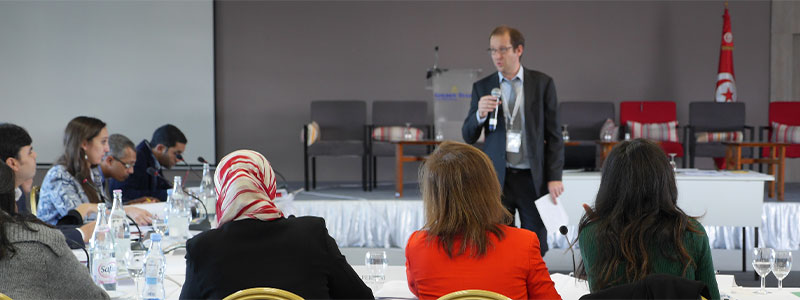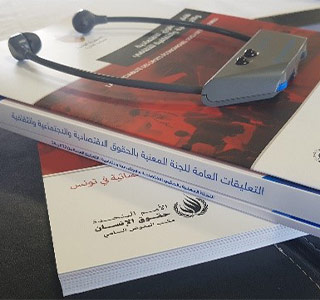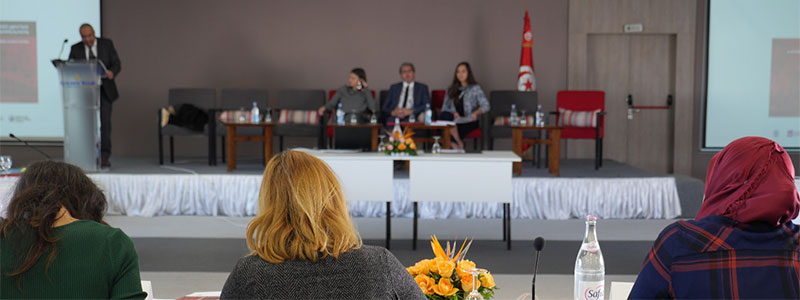IBAHRI’s Tunisia project: 2018–2021
Lire en français

Dr Christophe Golay, Senior Research Fellow and Strategic Adviser on Economic, Social and Cultural Rights, speaks to the audience at the December 2018 ToT workshop, Tunis © Vanessa Passo
Background
Between 2012 and 2016, the IBAHRI worked with and trained 1,800 Tunisian judges and prosecutors on the applicability of international human rights standards to domestic proceedings and the role of a judge in a democratic society. The IBAHRI also launched an international criminal law (ICL) training programme in 2014 aimed at strengthening the understanding and application of ICL principles in Tunisia’s domestic courts.
The project
In 2018, the IBAHRI partnered with the International Legal Assistance Consortium (ILAC), the Office of the United Nations High Commissioner for Human Rights (OHCHR) in Tunisia and the Tunisian Administrative Tribunal on a project to increase the ability of administrative judges, lawyers and civil society actors to adjudicate, litigate and report violations of economic, social and cultural rights (ESCR).
The project consists of a series of training workshops to take place over the course of 2018–2021.

OHCHR Guide: The Justiciability of Economic, Social and Cultural Rights: Legal Frameworks and Jurisprudential Practice for Tunisia (available in French and Arabic) © IBAHRI
Part I: Training and capacity building of Tunisian judges
Activities: three training of trainers (ToT) workshops and six application workshops for administrative judges between 2018 and 2019.
Two of the three ToT workshops took place in Tunis in December 2018 (5–6 December and 7–8 December).

Mr Adbessalem Mehdi Grissiâa, First President of the Tunisian Administrative Tribunal, gives opening speech of the training programme © Vanessa Passos
The first workshop began with an opening ceremony by:
Both trainings focused on the justiciability of ESCR in Tunisia and aimed to increase the capacity of Tunisian administrative judges to adjudicate violations of ESCR in line with international human rights law standards and to provide peer-to-peer training on ESCR.
It was the first training of Tunisian administrative judges related to ESCR.
The workshops were delivered by a team of four legal experts:
-
Fathi Zaabar ToT expert
-
Christophe Golay ESCR expert
-
Khaled Mejri Tunisian lecturer
-
Hana Ben Abda Tunisian lecturer
The third ToT workshop took place in Sousse in January. The six application workshops will take place throughout 2019.
Part II: Training and capacity building of Tunisian lawyers
Activities: one ToT workshop and two application workshops for Tunisian lawyers in 2020.
(To come.)
Part III: Training and capacity building of Tunisian civil society actors
Activities: one ToT workshop and two application workshops for Tunisian civil society actors over the course of 2020 and 2021.
(To come.)
Useful resources
-
OHCHR Guide: The Justiciability of Economic, Social and Cultural Rights: Legal Frameworks and Jurisprudential Practice for Tunisia (available in French and Arabic)
-
Khaled Mejri: Regulations of Rights and Freedoms: Commentary on Chapter 49 of the Tunisian Constitution (only available in Arabic)
-
ESCR-Net: ‘International Network for Economic, Social and Cultural Rights connects over 280 non-governmental organisations, social movements and advocates across more than 75 countries to build a global movement to make human rights and social justice a reality for all.’